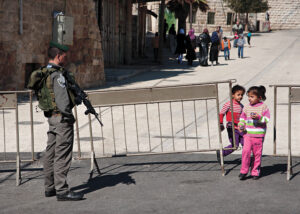I have a few observations to make about the open letter from the Mennonite Church Canada network of regional working groups on Palestine and Israel (“MC Canada working groups call for sanctions against Israel,” May 21, page 28). You will need to read this letter to understand and evaluate my comments.
Taking sides
When people go to war, social pressure to take sides can become intense. Hesitating to declare oneself can feel like a betrayal of friends and acquaintances. This is one of the many reasons love of enemy is easier said than done.
To act out love of enemy may seem like a rejection of friends and acquaintances whom the enemy has injured. This is also why expressions of solidarity are such a risky business for a peace church. Expressions of solidarity easily get mixed up with the ancient social instinct to pull together with friends and family in the face of an adversary.
It is in this light that I observe that the open letter begins with a kind of declaration of allegiance. The authors align with “our Palestinian Christian brothers and sisters,” and is a response to their call to end Israel’s illegal occupation.
Not only does the letter call for justice, it appears we are defending our own brothers and sisters against Israel. Lines are being drawn on a ground prepared for binary thinking: family/not family, insider/outsider, neighbour/stranger, friend/enemy. This binary outlook ends up influencing much of the rest of the open letter.
Moral certainty
When engaged in conflict one may be asked to do hard things to individuals on the other side. Many people are uneasy about this. We find it easier if our target is part of a group that is clearly in the wrong and obviously “has it coming.”
The open letter proceeds with a narrative that associates a particular group (Jewish Israel) with collective wrongdoing. To my knowledge, the facts in the narrative are materially correct and they are very troubling. What the narrative does not include are facts that would complicate the picture, that might make it difficult to decide what to do, or that might spread the blame.
In brief, this account strives for clarity and certitude. It justifies Mennonite alignment with our Palestinian brothers and sisters, and against Israel. It establishes the wickedness of the adversary.
Demonstrating commitment
In the final sentences of the open letter, the alliance with our brothers and sisters in opposition to Israel is sealed by a small aggression—a little metaphorical bloodletting. That is, the authors—and Mennonite Church Canada—advocate nonviolent sanctions against Israel until a “comprehensive solution is found.” Based on the 70-plus-year history of the conflict, that could be a long time.
It may seem a little harsh to describe such sanctions as aggression and “metaphorical bloodletting.” The fact of the matter is, economic sanctions have been part of the warrior’s toolkit throughout recorded history. Furthermore, sanctions tend to “work” by making someone, somewhere, suffer.
An extreme example may be found in Gaza, which has been suffering under economic sanctions and blockades by Israel, Egypt and the Palestinian Authority. I am quite certain that the authors of the open letter do not intend these kinds of sanctions.
Unfortunately, it is not clear what they do intend. The authors do not explain how sanctions will help, or how deeply they may bite before ceasing to be “nonviolent.” One wonders whether this tactic may just as likely inflame or prolong the conflict as resolve it. What the push for sanctions does makes clear is who we are with, who we are against, and that we have joined the battle.
Knowing our enemies
In summary, by this very minor act of hostility directed at Israel, Mennonites have acknowledged not merely that they have enemies, but that they are quite capable of making them.
I am not arguing that there is anything shameful in having enemies, or even in making them, if it is done through an act of integrity. The problem, for people who purport to follow Jesus, is figuring out how to love one’s enemy.
My concern with the open letter is that it relies on polarizing rhetoric and resorts to an act of symbolic aggression, both of which are tried and true techniques of triggering ancient patterns of very real social aggression.
As an alternative, I suggest the following: Now that MC Canada has joined the struggle against Israel, congregations need to take seriously their calling to love their enemies. This should include trying to open lines of communication with the people who may receive that call for sanctions as a personal attack. Checking in with the closest synagogue could be a worthwhile first step to opening a difficult if crucial dialogue.
Russel Snyder-Penner works as a lawyer in Kitchener-Waterloo, Ont., and is a student of theology at Conrad Grebel University College.







Leave a Reply
You must be logged in to post a comment.